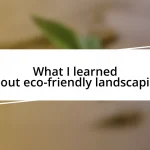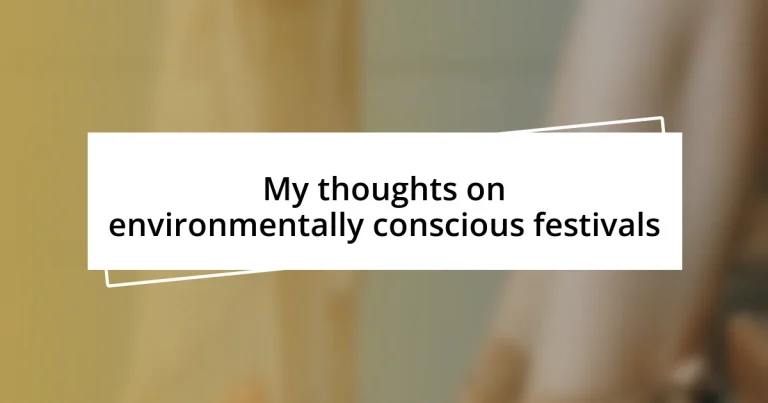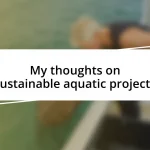Key takeaways:
- Environmentally conscious festivals foster community engagement and promote sustainability through practices like waste reduction, resource conservation, and shared values among attendees.
- Implementing eco-friendly practices such as biodegradable materials, interactive learning experiences, and sustainable transportation options enhances the festival experience and educates participants about their environmental impact.
- Personal experiences at festivals, like participating in clean-up efforts and exploring plant-based diets, highlight the importance of mindfulness and community actions in fostering a sustainable lifestyle beyond the event.
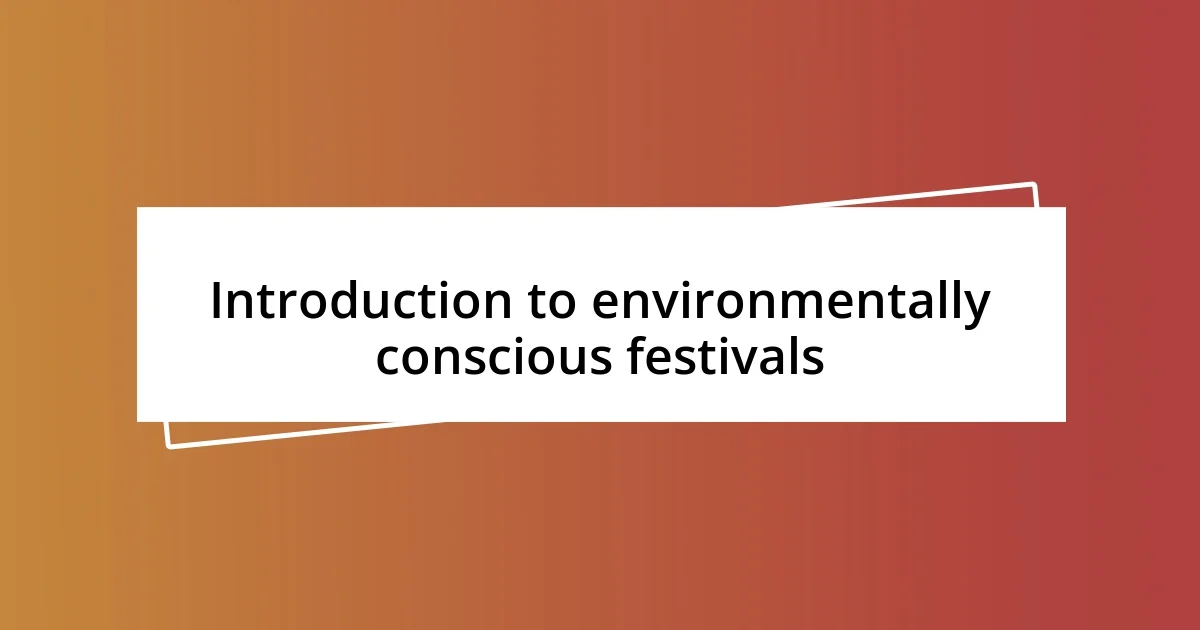
Introduction to environmentally conscious festivals
Environmentally conscious festivals are more than just events; they symbolize a collective commitment to sustainability and eco-friendliness. I remember attending a local music festival where they encouraged attendees to bring reusable cups and offered discounts for doing so. It warmed my heart to see so many people engaging in a simple act that significantly reduced waste.
The purpose behind these festivals often transcends entertainment; they aim to foster a sense of community around environmental awareness. Have you ever felt that rush of excitement when surrounded by others who share your values? At one festival I visited, workshops on sustainable living and renewable energy were a highlight, uniting attendees not just in music but in a shared vision for a greener future.
As we step into the vibrant world of these festivals, it’s essential to understand their impact and the steps they take to promote environmental responsibility. From sourcing local food to integrating renewable energy solutions, every little change matters. I have often pondered, how can we bring the joy of these gatherings back to our everyday lives, inspiring others to embrace similar values? It’s through shared experiences and a commitment to sustainability that we can dream of a better world.
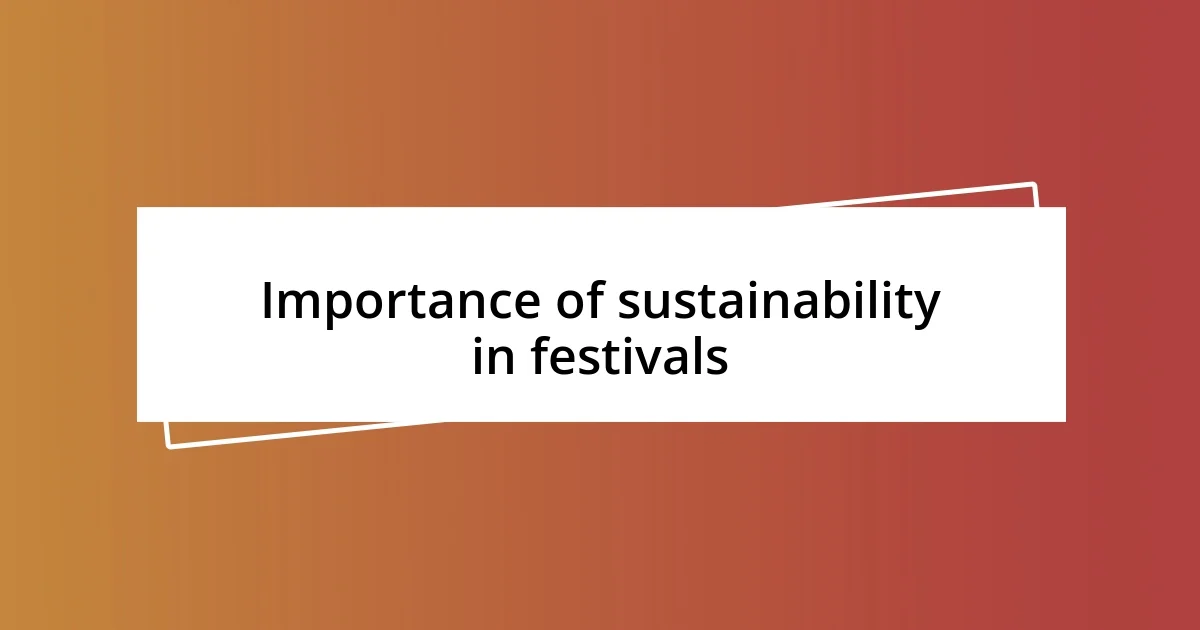
Importance of sustainability in festivals
Sustainability in festivals is crucial for several reasons. It not only helps to minimize waste but also raises awareness about environmental issues among attendees. I recall a time at a festival where they set up composting stations. Watching people eagerly sort their waste made me feel like we were collectively part of something bigger—a movement toward eco-consciousness.
Here are a few reasons why sustainability is vital in festival settings:
- Waste Reduction: Implementing recycling and composting significantly lowers the amount of trash that ends up in landfills.
- Resource Conservation: Using local vendors reduces carbon footprints associated with transportation.
- Community Engagement: Environmentally conscious practices encourage attendees to connect over shared values and inspire ongoing sustainable actions beyond the event.
- Cultural Shift: By showcasing sustainable practices, festivals can influence fans to adopt more eco-friendly habits in their everyday lives.
Each of these aspects underscores how festivals can be a powerful platform for promoting sustainability and fostering a deeper relationship with our environment.
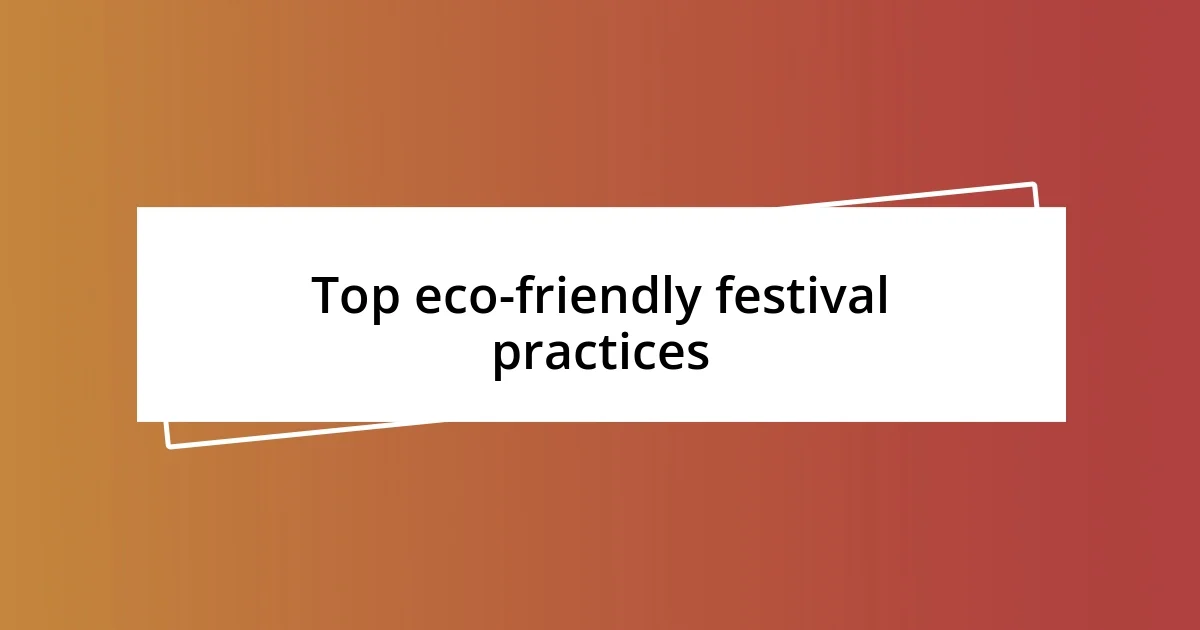
Top eco-friendly festival practices
One of the standout practices among eco-friendly festivals is the use of biodegradable materials for food packaging. I remember unwrapping my vegan burrito at a festival and being pleasantly surprised to find it wrapped in compostable paper instead of plastic. It felt great to know that even my food choices were contributing to a cleaner environment. This small shift can significantly cut down on plastic waste, making a big impact over thousands of attendees.
Engaging attendees in a meaningful way is also essential for environmentally conscious festivals. At a recent gathering I attended, there were interactive booths where festival-goers could learn about reducing their carbon footprints through fun demonstrations. I couldn’t help but feel a sense of camaraderie as everyone enthusiastically discussed simple steps we could take at home. These shared experiences highlight how festivals can both educate and entertain, creating a lasting impression on participants.
Moreover, implementing sustainable transportation options is increasingly vital. I participated in a bike-and-ride program at a festival which encouraged attendees to cycle to the venue. This not only reduced vehicle emissions but also created an electric excitement among the riders. Experiences like this show how eco-friendly initiatives can transform a festival into a celebration of sustainability, uniting people with a common purpose.
| Practice | Description |
|---|---|
| Biodegradable Materials | Using compostable packaging for food and drinks to reduce plastic waste. |
| Interactive Learning | Creating engaging stations that educate attendees about sustainability efforts. |
| Sustainable Transportation | Encouraging eco-friendly travel, like biking, to decrease carbon emissions. |
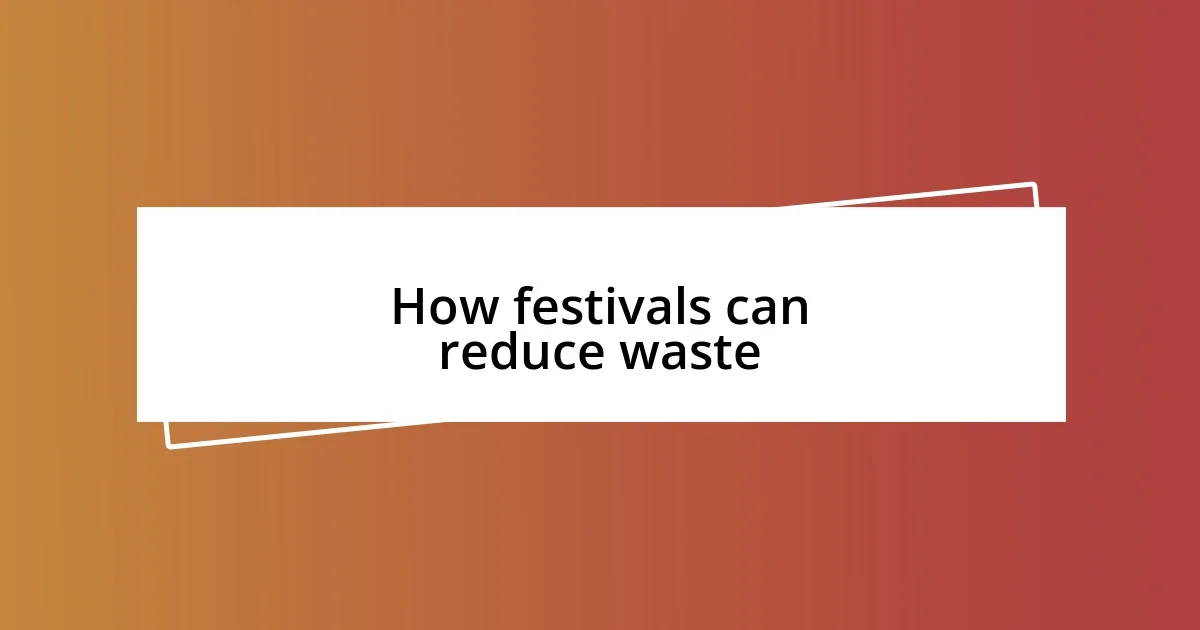
How festivals can reduce waste
Festivals can significantly reduce waste by implementing robust recycling programs. I remember being pleasantly surprised at a festival where they not only provided clearly marked recycling bins but also had friendly volunteers ready to guide attendees on proper waste disposal. It dawned on me: how many other events could benefit from a similar approach? Engaging with the audience in this manner invites everyone to take ownership of their waste.
Additionally, partnering with local artisans and food vendors is a strategy that creates a win-win situation. I once visited a festival where every food stall highlighted their zero-waste initiatives. The excitement in the air was palpable as people flocked to taste delicious dishes that came with minimal packaging. It reminded me that supporting local businesses amplifies the impact—we’re not just reducing waste, but also fueling our community. Isn’t it fulfilling to know that our choices can extend our commitment to sustainability even further?
Finally, creating a culture of mindful consumption can transform how festival-goers think about waste. During one festival, I encountered a creative art installation made entirely from discarded materials brought in by attendees. It was fascinating to see how people took what they considered waste and turned it into something beautiful. This experience made me reflect on how we view waste in our lives. Could we, as festival-goers, channel that same creativity beyond the event? It’s experiences like these that stick with us, igniting conversations that ripple through our communities long after the last song fades.
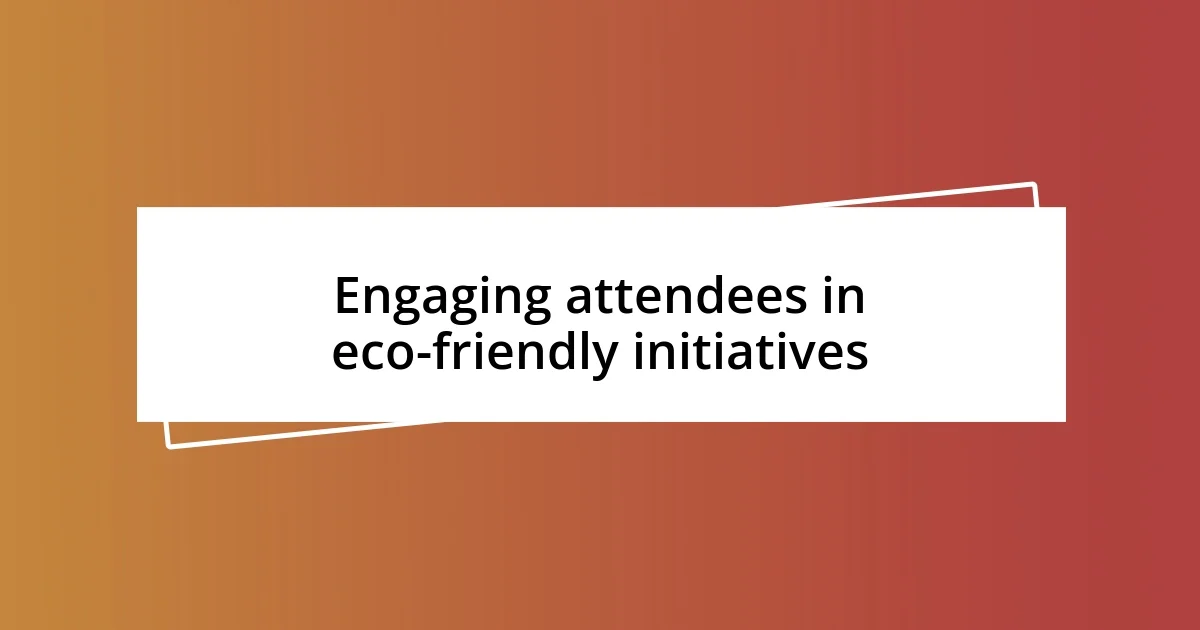
Engaging attendees in eco-friendly initiatives
To truly engage attendees in eco-friendly initiatives, incorporating hands-on activities can make a memorable impact. I recall attending a festival where they set up a DIY upcycling station. Attendees transformed discarded materials into something functional or artistic. The thrill of creating something new from what was once considered waste brought a sense of accomplishment and sparked conversations about sustainability. Isn’t it amazing how creativity can shift our perspective on what we deem as garbage?
In another instance, I participated in a festival workshop where local farmers shared their organic gardening tips. The genuine enthusiasm they had for sustainable farming was contagious. As we planted herbs to take home, I felt a connection not just to nature, but also to the community around me. Engaging in these activities fosters a deeper understanding of the impact our choices have on the environment. It made me wonder—how can we carry these valuable lessons beyond the festival grounds into our daily lives?
Lastly, I find that gamifying eco-friendly practices can elevate engagement levels dramatically. During one festival, there was a challenge to create a ‘green team’ where attendees competed to see who could collect the most recyclables. The friendly competition fueled excitement and camaraderie. As I watched teams work together, I realized how easily fun and sustainability can go hand in hand. It’s moments like these that not only educate but also empower individuals to take action. What if every festival adopted this playful approach to eco-consciousness? The possibilities are endless!
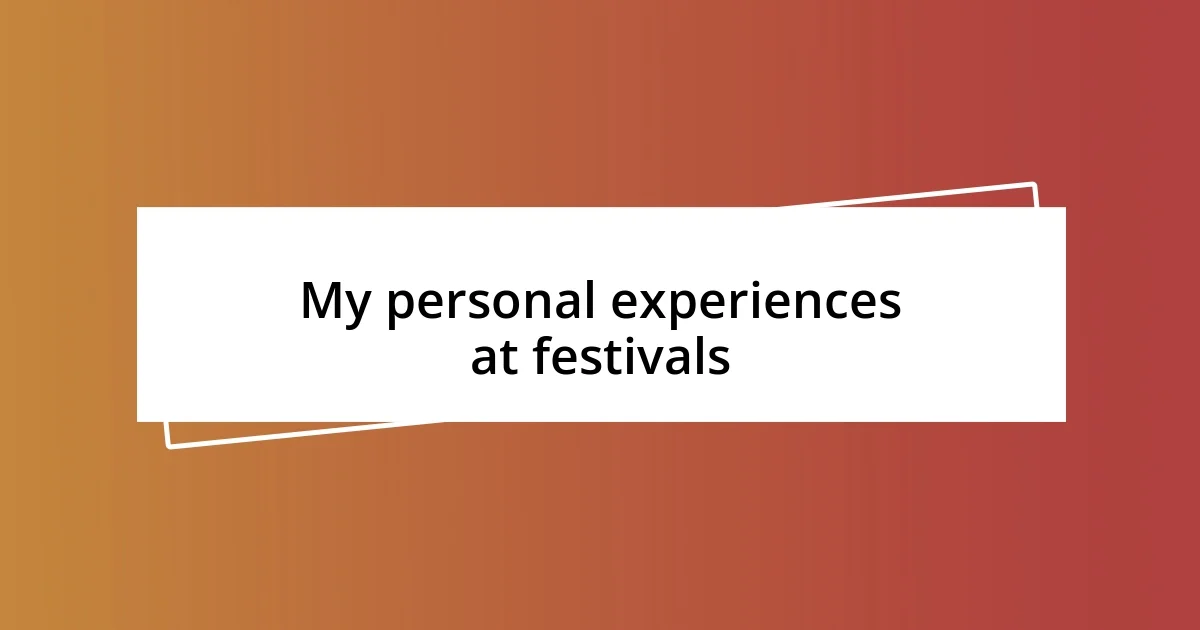
My personal experiences at festivals
Thinking back on my festival experiences, a moment stands out vividly. At one of the events, I joined a group that organized a clean-up after the last act. Picking up litter while chatting with fellow attendees gave me a sense of camaraderie I hadn’t anticipated. It was a bonding experience that made me think—when we all work towards a common goal, isn’t it heartwarming how it brings us together?
Another festival I attended had a focus on plant-based eating, which was such a game-changer for me. I ventured into a food stall that showcased incredible vegan dishes, and tasting them completely transformed my view on sustainability. I remember the chef passionately explaining how plant-based diets not only benefit our health but also lessens our environmental impact. It left me pondering—how many meals could we make that are both delicious and planet-friendly?
Lastly, I recall participating in a calm, reflective space at a festival where yoga and meditation were emphasized. As I practiced under the open sky, I felt a profound connection to the earth and its wellbeing. The experience filled me with warmth and tranquility, prompting thoughts about how mindfulness can extend far beyond the festival experience. Isn’t it interesting how these moments not only spark joy but also motivate us to be more conscious of our environment?











